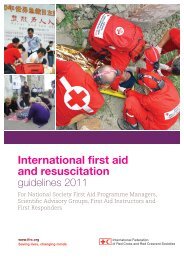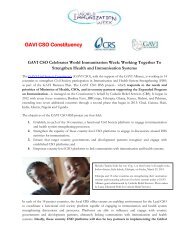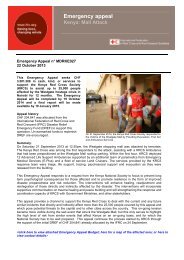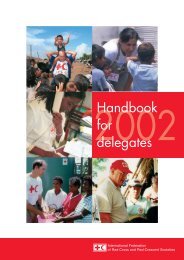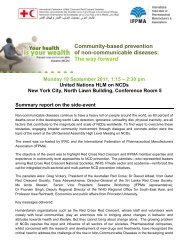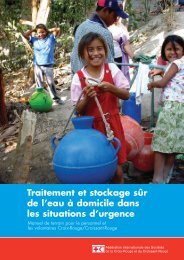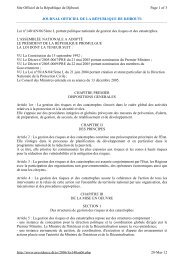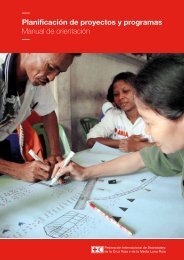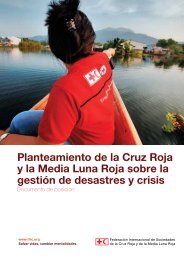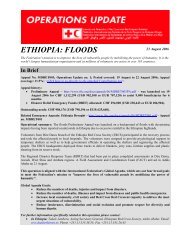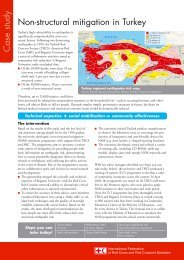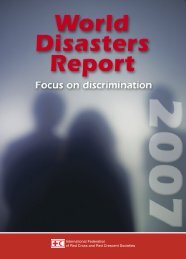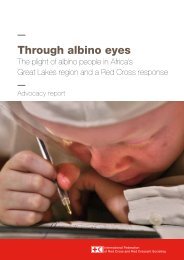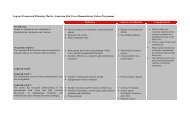World Disasters Report 2010 - International Federation of Red Cross ...
World Disasters Report 2010 - International Federation of Red Cross ...
World Disasters Report 2010 - International Federation of Red Cross ...
Create successful ePaper yourself
Turn your PDF publications into a flip-book with our unique Google optimized e-Paper software.
The UNDP Country Office intervention provided technical disaster risk reduction<br />
and recovery assistance to municipal governments. Although the project is a UNDP<br />
initiative, it relied on the unique position <strong>of</strong> local governments to identify local priorities<br />
to reduce disaster risk. The municipal governments prioritized four areas, to which<br />
UNDP provided close and permanent guidance: local governance; housing and territorial<br />
management; economic reactivation; and information management.<br />
Results include the initiation <strong>of</strong> a process for updating and redesigning the municipalities’<br />
development plans (ten years) and annual plans for promoting sustained recovery<br />
and risk reduction as well as the inclusion <strong>of</strong> development and capacity-building<br />
issues into the reconstruction, such as livelihoods, gender, information management<br />
and institutional strengthening. Furthermore, the municipal governments’ regular<br />
tools and methods, such as their public investments system and information systems<br />
for monitoring and disseminating information, were improved. Land-use plans were<br />
revised and made risk-sensitive. The comprehensive range <strong>of</strong> results has been an indication<br />
<strong>of</strong> what can be achieved by local governments with the right support.<br />
Essential 2<br />
Changing standards for land-for-housing in Namibia<br />
Windhoek, Namibia<br />
(From <strong>International</strong> Institute for Environment and Development (IIED), Urban<br />
Development and Intensive and Extensive Risk, Contribution to the Global Assessment<br />
<strong>Report</strong> on Disaster Risk <strong>Red</strong>uction, 2009.)<br />
The city authorities in Windhoek recognized that to reach low-income households,<br />
they had to cut unit costs in their government-funded serviced-site programme. This<br />
programme had to recover the costs <strong>of</strong> developing land (both for housing and with<br />
infrastructure to <strong>of</strong>ficial standards), but this made it too expensive for low-income<br />
groups. This example from Namibia is interesting in that it shows how a change in<br />
approach by the city government greatly increased the possibilities for low-income<br />
households to be able to get their own housing.<br />
A new government policy, developed with the Shack Dwellers <strong>Federation</strong> <strong>of</strong> Namibia<br />
(a federation <strong>of</strong> savings groups formed mostly by low-income women), showed a<br />
willingness to overturn conventional approaches to standards and regulations, for<br />
instance in plot sizes and in infrastructure standards, to make their serviced sites more<br />
affordable to low-income households. Plots can be rented, group purchased or leased.<br />
Significantly, families are allowed to upgrade services as they can afford to make the<br />
investments, extending sewerage and water lines from mains provision into their<br />
homes. Groups that belong to the Shack Dwellers <strong>Federation</strong> have access to their own<br />
loan fund from which they can borrow for such service improvements, and around<br />
1,000 groups have taken such loans at an average household cost <strong>of</strong> US$ 150. However,<br />
this underestimates the number <strong>of</strong> improvements, because once households have<br />
<strong>World</strong> <strong>Disasters</strong> <strong>Report</strong> <strong>2010</strong> – Disaster data<br />
193



